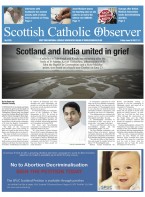July 19 | ![]() 0 COMMENTS
0 COMMENTS ![]() print
print

Jesus moved in the company of sinners
KEVIN MCKENNA — The Gospels show that Our Lord was aware that every sinner has a futrure just as every saint has a past
IF YOU have devoted your life to studying the Gospels like I have then, like me, you will probably have found it difficult to resist compiling your top ten favourite miracles and teachings of Jesus. Some may find it somewhat distasteful and lacking in reverence to list these sacred and wondrous moments in the life of our saviour in such a fashion, but I disagree. We have all got our list of favourite films, books and musical works, so why not extend that to the top ten miracles?
The miracle of the loaves and fishes, of course, has an obvious and universal appeal, addressing as it does one of our basic human needs while, at the same time, conveying something of the essential compassion and kindness of Jesus. As a Christian Socialist, I also have an understandable fondness for Jesus’ encounter with the money-changers in the temple when—to deploy the argot of John Smeaton—He set aboot them. His dramatic and beautiful intervention during the stoning of Mary Magdalene was an early childhood lesson that none of us are beyond redemption and that all sinners have a place in Jesus’ heart. Every sinner has a future and every saint has a past, and all that.
My all-time favourite though, is the wedding feast of Cana. The fact that Jesus chose this as the first miracle of His public life was very significant to me. For—and let’s be frank here—any saviour who creates an endless supply of wine at the wedding of His friend is my kind of saviour. But it was more than that. For, Jesus’ Mother, the Blessed Virgin Mary, also acknowledged that any wedding with no booze is no kind of wedding at all.
Consider how many times Mary must previously have been tempted to ask Her Son to use His miraculous powers to make something better. She obviously waited until the time was right and when it would be most appreciated. And what could have been better received than stepping in to save the embarrassment of a friend on his special day and ensuring that everyone could have a right good drink—in The Lord, of course?
The fact that the wedding feast ran out of booze so early in the proceedings also tells us something: this must have been an absolute belter of a reception and that there would have been dancing on the tables long before midnight. What is more, Jesus must have been having a right good time too. And He wouldn’t have needed to be the Son of God to realise all the possible outcomes of providing a limitless supply of wine for the occasion. He must have known that lots of his fellow guests—possibly including some of the apostles, by the way—would be more than a little tipsy by the end of the proceedings. This alone has provided me with great reassurance and spiritual sustenance down through the years, especially on those regrettable occasions when the drink has caught me unawares.
Not for a moment am I advocating that we should all get hammered at weddings and barbecues this summer. As my beloved Gran McKenna used to say: “Amuse yersel, but don’t abuse yersel.” It’s just that, well… let’s not be too harsh on ourselves or too hasty to pass judgment on others. And I only mention it too on account of a couple of faintly disturbing magazine articles I have read in recent weeks.
Firstly, Time Magazine carried a special report on how Pentecostalism and Evangelicalism were beginning to take root among North America’s Hispanic communities. There were several reasons given for this, not the least of which was complacency and absence of leadership in the Catholic Church. Earlier this month The Spectator focused on the rise of the evangelicals in England and Wales.
This is something, I feel, that ought to concern us all. For evangelical Christians, in my experience, tend towards a slightly oppressive attitude towards those attitudes and behaviours that may be considered too worldly. They have a depressing tendency also to view the world and their fellow citizens in it in purely black and white terms. There is very little room for manoeuvre in their existence.
At this point I must declare an interest as I lived among a community of these people for several years, every single one of whom was an absolute prince or a princess. But, dearie, dearie me; some of them didn’t half seek to run other people’s lives for them. This wouldn’t have been all that bad if they had been advocating a relaxed and laid back attitude to following the Lord. Alas, no.
On one occasion my then girlfriend was told that the dress she was wearing was causing a certain unhealthy frisson amongst the brothers. I swear to Almighty God though, that if she had been wearing anything more demure she would have been in a burka. Otherwise harmless pursuits, such as listening to heavy rock music or watching more than four hours of television a day were considered distinctly verboten. Much of this was, of course, an inauthentic and contrived form of Christian behaviour that had more to do with the immature prejudices of an assortment of US college frat boys who came calling far too regularly for my liking. They seemed to be rendering the Kingdom of God about as attainable as a place on the next shuttle to Venus. They meant very well indeed but they scared the living daylights out of me.
I am not saying there isn’t a place for the tambourine and alleluiah brigade, of course there is. But let’s all keep it real this summer and ask ourselves what Jesus would have done if confronted by a bar and a roomful of sinners. This endeth the lesson.
— Kevin McKenna is former deputy editor of the Herald and former executive editor of the Daily Mail in Scotland. He is currently a columnist for the Guardian











